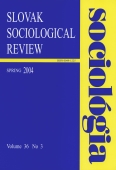The Role of Language Skills and Foreign Country Experiences in the Development of European Identity
The Role of Language Skills and Foreign Country Experiences in the Development of European Identity
Author(s): Daniel Fuss, Gema Garcia-Albacete, Miryam Rodrígues-MonterSubject(s): Social Sciences
Published by: SAV - Slovenská akadémia vied - Sociologický ústav
Keywords: Language skills; foreign contry experiences; education policy; value preferences; Language skills; foreign country experiences; and European identity;
Summary/Abstract: The Role of Language Skills and Foreign Country Experiences in the Development of a European Identity. Starting from the idea of a ‘People’s Europe’ the paper examines language skills and foreign country experiences among young men and women from selected European cities. Data from the research project ‘Youth and European Identity’ show significant differences with regard to the average number of languages mastered and the frequency of stays abroad. The statistical findings indicate that the more languages an individual is able to speak, and the more foreign country experiences he or she has, the stronger is his or her identification with Europe. Hence, the analyses support a basic assumption of the European Union’s education policy: promoting a sense of European-ness by fostering foreign language learning and encouraging personal contacts beyond national borders. On the other hand, language skills and foreign country experiences are not independent of an individual’s value preferences. Rather, capabilities and experiences tend to go together with a general orientation towards values of ‘Openness to Change’.
Journal: Sociológia - Slovak Sociological Review
- Issue Year: 2004
- Issue No: 3
- Page Range: 273-292
- Page Count: 20
- Language: English

